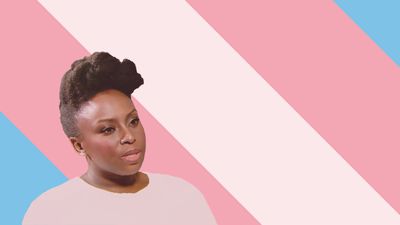We Need To Erase The Phrase “Real Women” From Our Vocabulary
A cisgender woman writes about the importance of making conversations surrounding womanhood more inclusive of trans women.
Today is International Transgender Day of Visibility. It's also the perfect opportunity for us women to make our conversations and plights surrounding womanhood more inclusive of trans women by acknowledging their seat at the table. Not just today but every day.
I think that I speak for the bulk of us when I say that we’re socialised to believe that “womanhood” and the title "woman" is exclusive to those born with a vagina. Though after doing a lot of reading on the subject of gender and getting lost in different conversations I have had a mental shift. I am now aware of how fluid and fabricated gender is.
Let me break it down. There is sex which is what physically sets us apart as male, female and intersex. Our genitalia is something that we can actually touch. Then there is gender. Gender is the social divisions of feminine and masculine, simply put these are the social characteristics that men and women are believed to have which inform how they act. Gender is social and therefore not something that you can touch.
Also, gender is completely blurred because a characteristic that is stereotypically believed to be masculine like being aggressive can be exhibited by men or women. Someone who is “trans” is a person whose gender which was assigned to them at birth doesn’t match the gender they identify with.
So then, what is the logic behind policing something so fluid and fabricated as gender? And for those of us who identify as feminists, is it fair to say one person’s womanhood is more real than the another’s? By making a hierarchy of womanhood and marginalizing some women based on their experiences are we not re-creating the same systems of oppression that we are trying to dismantle?I have heard arguments, like Chimamanda Adichie’s, which assert that because trans women were born male they experienced the privileges that the world accords men. As a result, trans women have been relieved from the particular burdens specific to being born female, growing up a girl and the impact that then has on how women then go on to engage with the world as a result of how they are treated differently to boys.
Do I agree? Yes and no. I agree that womanhood is experience based however I do not agree with the idea that one is more of a woman because she was born with a vagina. In Simon de Beauvoir’s words “one is not born, but rather becomes, a woman."
We must acknowledge our different experiences of womanhood because we cannot dilute it all down to a single one, doing so eliminates the different realities – which in itself is flawed. Naturally my experiences, as a woman born a girl, will be unlike those of a trans woman’s in the same way that a black middle class South African woman will experience life differently from a woman born and raised in Saudi Arabia.
But, at the core of our womanhood is it not the shared stories of our experiences with oppression, at the hands of patriarchy, that band us together as women? Is it not a case of how we each choose to identify? All in all is our sisterhood not cemented by the reality that when the world looks at us we are a collective and individual other in contrast to a man?
I am of the belief that women born female are afforded a privilege by society that offers us the title of “real” women. And, that privilege comes with the power to make trans women feel alienated from womanhood. Therefore it is our responsibility, especially those of us who identify as feminists and whose feminism is intersectional, to make womanhood inclusive of the different experiences of being a woman.The diversity of womanhood is what makes it so rich and beautiful. As black feminists, if we are going to say that it is wrong for our womanhood to be defined by the understanding of white women’s lived experiences then how do we justify narrowing it down to our understanding and experiences?
Women born with vaginas and trans women face similar struggles of oppression. Our liberation is interwoven. Trans women’s issues are women’s issues. We need to erase the phrase “real women” because this exclusion of trans women has real and negative consequences that feed the view that trans women are men.
Unless we’re determined to perpetuate the history of erasing women’s voices and experiences then we all have to assume a role in changing unacceptable behavior that alienates. It’s up to us to make womanhood more inclusive and celebrate every type of woman.
